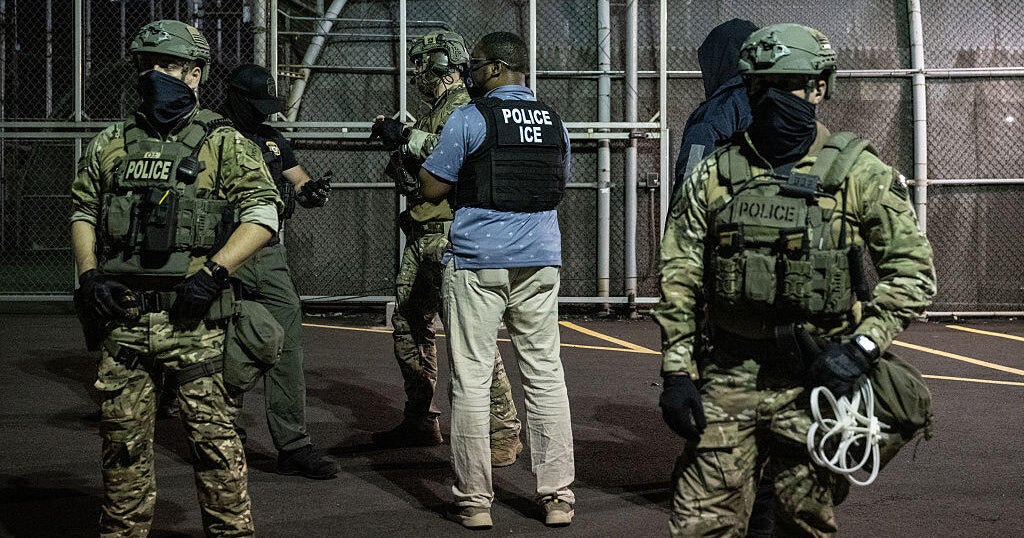In a recent turn of policy, the Trump administration has revoked a brief suspension on immigration arrests in key sectors of the U.S. economy, namely farms, hotels, and restaurants. This decision, initially welcomed by industry leaders, was quickly reversed, indicating a continuation of the administration’s hardline stance on immigration enforcement.
Just a few days prior, internal communications suggested that U.S. Immigration and Customs Enforcement (ICE) officials would temporarily halt worksite enforcement actions targeting these sectors. The move was seen as a response to concerns voiced by stakeholders in these industries about the detrimental impact of aggressive immigration crackdowns on their workforce, many of whom are foreign-born and include individuals residing in the U.S. either illegally or under temporary humanitarian programs.
The original pause aimed to address the worries of industry leaders who argued that President Donald Trump’s stringent measures against illegal immigration were causing fear and uncertainty among their crucial immigrant employees. This workforce uncertainty threatened the operational stability and economic contributions of these sectors, which are heavily reliant on immigrant labor. President Trump himself appeared to acknowledge the pivotal role of these workers in comments made last week, suggesting a forthcoming order to shield these industries. “We can’t take farmers and take all their people and send them back because they don’t have, maybe, what they’re supposed to have, maybe not,” he stated, emphasizing the use of “a lot of common sense” in handling this issue particularly concerning farmers and the leisure sector.
However, this brief respite was swiftly rescinded, as ICE officials were informed in a recent guidance call that they should continue with targeted worksite operations designed to apprehend unauthorized immigrants working in these fields. According to sources familiar with this change, who spoke under the condition of anonymity, these operations are deemed important for public safety, national security, and economic stability.
In a statement, Department of Homeland Security spokeswoman Tricia McLaughlin clarified the administration’s position, remarking, “The President has been incredibly clear. There will be no safe spaces for industries who harbor violent criminals or purposely try to undermine ICE’s efforts.” She further elaborated that worksite enforcement remains a cornerstone of their strategy to “target illegal employment networks that undermine American workers, destabilize labor markets, and expose critical infrastructure to exploitation.”
The brief halt and its abrupt end stand in stark contrast to broader trends under the Trump administration, which has consistently pursued a policy of escalating immigration arrests as part of its goals to deport millions of undocumented residents in the U.S. Top immigration advisers to the President, such as Stephen Miller and Tom Homan, have been vocal about intensifying these worksite raids as a means to fulfill the administration’s broader deportation objectives.
For instance, the agency’s recent activities include an operation in Omaha, Nebraska, where ICE arrested more than 70 migrants at a meat processing plant. This operation was highlighted by the agency as the largest of its kind in Nebraska. Overall, daily arrest rates by ICE have seen a significant increase, from an average of 660 in Trump’s first 100 days to about 1,200 in June. This surge is attributed largely to enhanced operations in major U.S. cities like Los Angeles, with support from other federal agencies such as the FBI and Customs and Border Protection. Despite this increase, the numbers still fall short of the 3,000 daily arrests targeted by the White House.
The oscillation between relaxation and reinforcement of immigration enforcement in sectors critical to the U.S. economy reflects the complex dynamics and pressures facing the Trump administration. On one hand, the need to maintain economic stability and operational efficacy in vital industries necessitates a more nuanced approach to immigration. On the other, the administration’s overarching commitment to stringent immigration control and heightened enforcement aims to satisfy a key campaign promise and appease its base.
The consequences of such rapid policy shifts are profound, impacting not only the targeted immigrant communities but also the industries that depend on them and the broader economic and cultural fabric of the United States. As the debate over immigration policy continues to evolve, stakeholders from all sides — from business leaders to advocacy groups to the immigrants themselves — remain vigilant and engaged, each pushing for outcomes that align with their interests and visions for America’s future.
As these developments unfold, it is clear that immigration will remain a contentious and pivotal issue, shaping the socio-economic landscape of the U.S. and the lives of millions residing within it.









